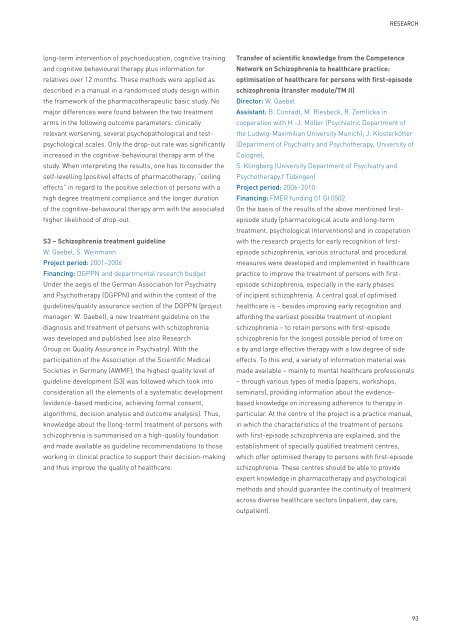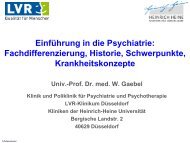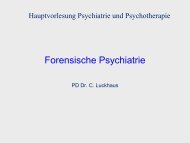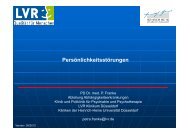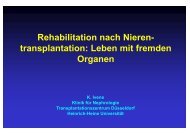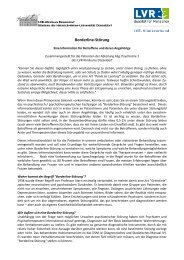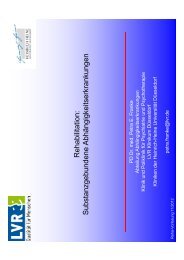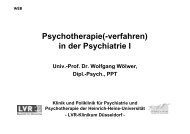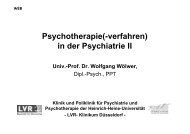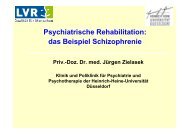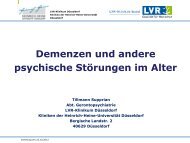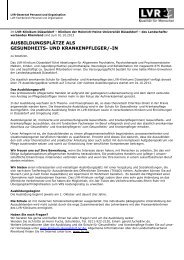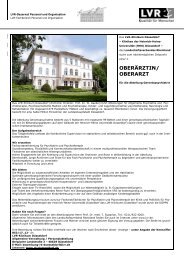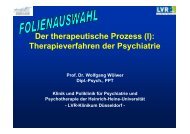LVR-Klinikum Düsseldorf Hospital of the Heinrich-Heine University ...
LVR-Klinikum Düsseldorf Hospital of the Heinrich-Heine University ...
LVR-Klinikum Düsseldorf Hospital of the Heinrich-Heine University ...
Create successful ePaper yourself
Turn your PDF publications into a flip-book with our unique Google optimized e-Paper software.
long-term intervention <strong>of</strong> psychoeducation, cognitive training<br />
and cognitive behavioural <strong>the</strong>rapy plus information for<br />
relatives over 12 months. These methods were applied as<br />
described in a manual in a randomised study design within<br />
<strong>the</strong> framework <strong>of</strong> <strong>the</strong> pharmaco<strong>the</strong>rapeutic basic study. No<br />
major differences were found between <strong>the</strong> two treatment<br />
arms in <strong>the</strong> following outcome parameters: clinically<br />
relevant worsening, several psychopathological and testpsychological<br />
scales. Only <strong>the</strong> drop-out rate was significantly<br />
increased in <strong>the</strong> cognitive-behavioural <strong>the</strong>rapy arm <strong>of</strong> <strong>the</strong><br />
study. When interpreting <strong>the</strong> results, one has to consider <strong>the</strong><br />
self-levelling (positive) effects <strong>of</strong> pharmaco<strong>the</strong>rapy, “ceiling<br />
effects” in regard to <strong>the</strong> positive selection <strong>of</strong> persons with a<br />
high degree treatment compliance and <strong>the</strong> longer duration<br />
<strong>of</strong> <strong>the</strong> cognitive-behavioural <strong>the</strong>rapy arm with <strong>the</strong> associated<br />
higher likelihood <strong>of</strong> drop-out.<br />
S3 – Schizophrenia treatment guideline<br />
W. Gaebel, S. Weinmann<br />
Project period: 2001–2006<br />
Financing: DGPPN and departmental research budget<br />
Under <strong>the</strong> aegis <strong>of</strong> <strong>the</strong> German Association for Psychiatry<br />
and Psycho<strong>the</strong>rapy (DGPPN) and within <strong>the</strong> context <strong>of</strong> <strong>the</strong><br />
guidelines/quality assurance section <strong>of</strong> <strong>the</strong> DGPPN (project<br />
manager: W. Gaebel), a new treatment guideline on <strong>the</strong><br />
diagnosis and treatment <strong>of</strong> persons with schizophrenia<br />
was developed and published (see also Research<br />
Group on Quality Assurance in Psychiatry). With <strong>the</strong><br />
participation <strong>of</strong> <strong>the</strong> Association <strong>of</strong> <strong>the</strong> Scientific Medical<br />
Societies in Germany (AWMF), <strong>the</strong> highest quality level <strong>of</strong><br />
guideline development (S3) was followed which took into<br />
consideration all <strong>the</strong> elements <strong>of</strong> a systematic development<br />
(evidence-based medicine, achieving formal consent,<br />
algorithms, decision analysis and outcome analysis). Thus,<br />
knowledge about <strong>the</strong> (long-term) treatment <strong>of</strong> persons with<br />
schizophrenia is summarised on a high-quality foundation<br />
and made available as guideline recommendations to those<br />
working in clinical practice to support <strong>the</strong>ir decision-making<br />
and thus improve <strong>the</strong> quality <strong>of</strong> healthcare.<br />
ReseaRch<br />
Transfer <strong>of</strong> scientific knowledge from <strong>the</strong> Competence<br />
Network on Schizophrenia to healthcare practice:<br />
optimisation <strong>of</strong> healthcare for persons with first-episode<br />
schizophrenia (transfer module/TM II)<br />
Director: W. Gaebel<br />
Assistant: B. Conradt, M. Riesbeck, R. Zemlicka in<br />
cooperation with H.-J. Möller (Psychiatric Department <strong>of</strong><br />
<strong>the</strong> Ludwig-Maximilian <strong>University</strong> Munich); J. Klosterkötter<br />
(Department <strong>of</strong> Psychiatry and Psycho<strong>the</strong>rapy, <strong>University</strong> <strong>of</strong><br />
Cologne);<br />
S. Klingberg (<strong>University</strong> Department <strong>of</strong> Psychiatry and<br />
Psycho<strong>the</strong>rapy,f Tübingen)<br />
Project period: 2006–2010<br />
Financing: FMER funding 01 GI 0502<br />
On <strong>the</strong> basis <strong>of</strong> <strong>the</strong> results <strong>of</strong> <strong>the</strong> above mentioned firstepisode<br />
study (pharmacological acute and long-term<br />
treatment, psychological interventions) and in cooperation<br />
with <strong>the</strong> research projects for early recognition <strong>of</strong> firstepisode<br />
schizophrenia, various structural and procedural<br />
measures were developed and implemented in healthcare<br />
practice to improve <strong>the</strong> treatment <strong>of</strong> persons with firstepisode<br />
schizophrenia, especially in <strong>the</strong> early phases<br />
<strong>of</strong> incipient schizophrenia. A central goal <strong>of</strong> optimised<br />
healthcare is – besides improving early recognition and<br />
affording <strong>the</strong> earliest possible treatment <strong>of</strong> incipient<br />
schizophrenia – to retain persons with first-episode<br />
schizophrenia for <strong>the</strong> longest possible period <strong>of</strong> time on<br />
a by and large effective <strong>the</strong>rapy with a low degree <strong>of</strong> side<br />
effects. To this end, a variety <strong>of</strong> information material was<br />
made available – mainly to mental healthcare pr<strong>of</strong>essionals<br />
– through various types <strong>of</strong> media (papers, workshops,<br />
seminars), providing information about <strong>the</strong> evidencebased<br />
knowledge on increasing adherence to <strong>the</strong>rapy in<br />
particular. At <strong>the</strong> centre <strong>of</strong> <strong>the</strong> project is a practice manual,<br />
in which <strong>the</strong> characteristics <strong>of</strong> <strong>the</strong> treatment <strong>of</strong> persons<br />
with first-episode schizophrenia are explained, and <strong>the</strong><br />
establishment <strong>of</strong> specially qualified treatment centres,<br />
which <strong>of</strong>fer optimised <strong>the</strong>rapy to persons with first-episode<br />
schizophrenia. These centres should be able to provide<br />
expert knowledge in pharmaco<strong>the</strong>rapy and psychological<br />
methods and should guarantee <strong>the</strong> continuity <strong>of</strong> treatment<br />
across diverse healthcare sectors (inpatient, day care,<br />
outpatient).<br />
93


